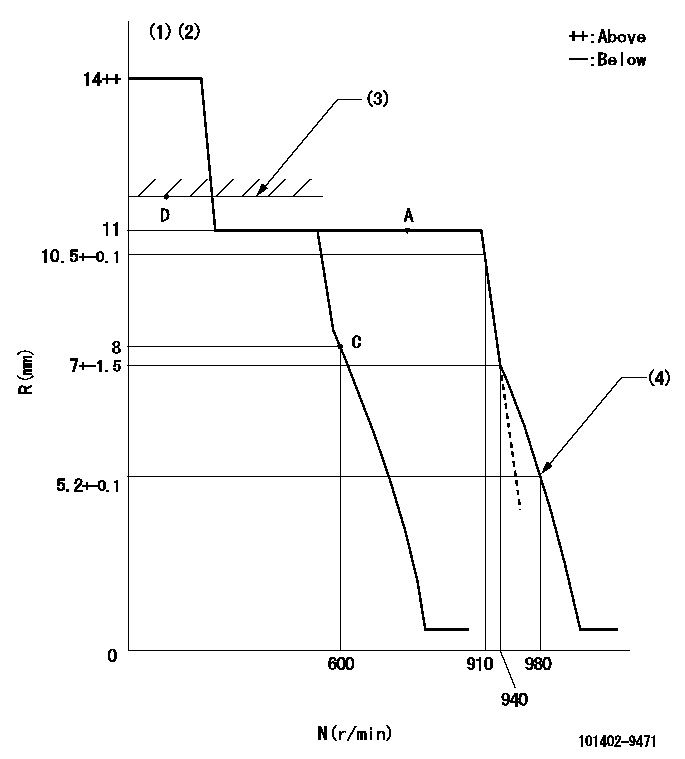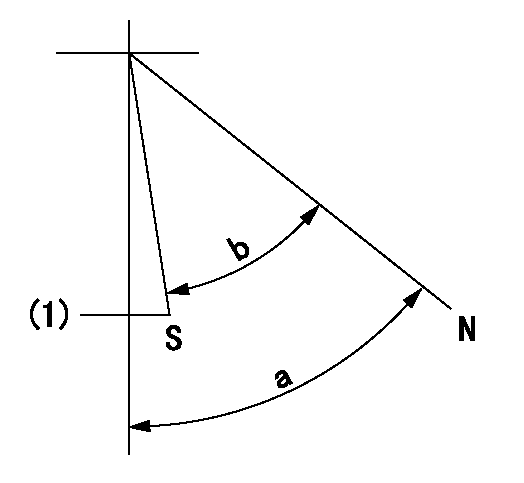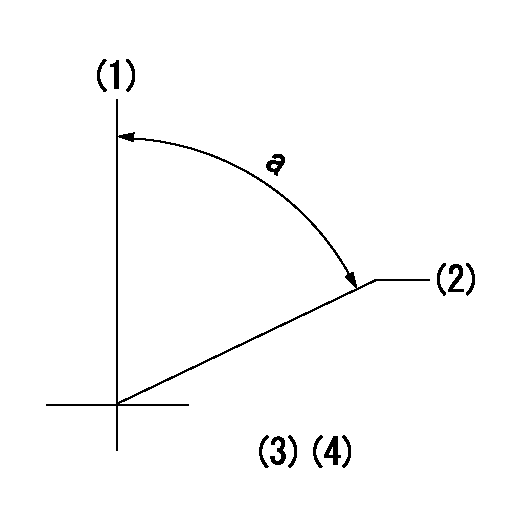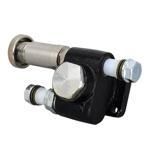Information injection-pump assembly
ZEXEL
101402-9471
1014029471

Rating:
Service parts 101402-9471 INJECTION-PUMP ASSEMBLY:
1.
_
5.
AUTOM. ADVANCE MECHANIS
6.
COUPLING PLATE
7.
COUPLING PLATE
8.
_
9.
_
10.
NOZZLE AND HOLDER ASSY
11.
Nozzle and Holder
12.
Open Pre:MPa(Kqf/cm2)
21.6{220}
13.
NOZZLE-HOLDER
14.
NOZZLE
15.
NOZZLE SET
Cross reference number
ZEXEL
101402-9471
1014029471
Zexel num
Bosch num
Firm num
Name
101402-9471
INJECTION-PUMP ASSEMBLY
4TNE94 14BC PE4A,5A, PE
4TNE94 14BC PE4A,5A, PE
Calibration Data:
Adjustment conditions
Test oil
1404 Test oil ISO4113 or {SAEJ967d}
1404 Test oil ISO4113 or {SAEJ967d}
Test oil temperature
degC
40
40
45
Nozzle and nozzle holder
105780-8140
Bosch type code
EF8511/9A
Nozzle
105780-0000
Bosch type code
DN12SD12T
Nozzle holder
105780-2080
Bosch type code
EF8511/9
Opening pressure
MPa
17.2
Opening pressure
kgf/cm2
175
Injection pipe
Outer diameter - inner diameter - length (mm) mm 6-2-600
Outer diameter - inner diameter - length (mm) mm 6-2-600
Overflow valve
131424-1520
Overflow valve opening pressure
kPa
157
123
191
Overflow valve opening pressure
kgf/cm2
1.6
1.25
1.95
Tester oil delivery pressure
kPa
157
157
157
Tester oil delivery pressure
kgf/cm2
1.6
1.6
1.6
Direction of rotation (viewed from drive side)
Right R
Right R
Injection timing adjustment
Direction of rotation (viewed from drive side)
Right R
Right R
Injection order
1-3-4-2
Pre-stroke
mm
3.6
3.55
3.65
Beginning of injection position
Drive side NO.1
Drive side NO.1
Difference between angles 1
Cal 1-3 deg. 90 89.5 90.5
Cal 1-3 deg. 90 89.5 90.5
Difference between angles 2
Cal 1-4 deg. 180 179.5 180.5
Cal 1-4 deg. 180 179.5 180.5
Difference between angles 3
Cyl.1-2 deg. 270 269.5 270.5
Cyl.1-2 deg. 270 269.5 270.5
Injection quantity adjustment
Adjusting point
A
Rack position
11
Pump speed
r/min
750
750
750
Average injection quantity
mm3/st.
51
50
52
Max. variation between cylinders
%
0
-2.5
2.5
Basic
*
Fixing the lever
*
Injection quantity adjustment_02
Adjusting point
C
Rack position
8+-0.5
Pump speed
r/min
600
600
600
Average injection quantity
mm3/st.
11.5
10.5
12.5
Max. variation between cylinders
%
0
-15
15
Fixing the rack
*
Injection quantity adjustment_03
Adjusting point
D
Rack position
-
Pump speed
r/min
100
100
100
Average injection quantity
mm3/st.
65
60
70
Fixing the lever
*
Rack limit
*
Test data Ex:
Governor adjustment

N:Pump speed
R:Rack position (mm)
(1)Notch fixed: K
(2)Tolerance for racks not indicated: +-0.05mm.
(3)RACK LIMIT
(4)Set idle sub-spring
----------
K=4
----------
----------
K=4
----------
Speed control lever angle

F:Full speed
I:Idle
(1)Stopper bolt setting
----------
----------
a=(2deg)+-5deg b=(11deg)+-5deg
----------
----------
a=(2deg)+-5deg b=(11deg)+-5deg
Stop lever angle

N:Pump normal
S:Stop the pump.
(1)At delivery
----------
----------
a=58deg+-5deg b=53deg+-5deg
----------
----------
a=58deg+-5deg b=53deg+-5deg
Timing setting

(1)Pump vertical direction
(2)Position of camshaft's key groove at No 1 cylinder's beginning of injection
(3)-
(4)-
----------
----------
a=(60deg)
----------
----------
a=(60deg)
Information:
Low power and engine response complaints can be caused by very different reasons and require different repairs, but are often the same complaint from the operator. A discussion with the operator is needed to help correctly diagnose whether to repair for low power or slow response. At times, full engine horsepower is available, but the operator still complains of low power. Repairs for low power would not provide a satisfactory result, and may consume many hours with expensive repairs. The actual complaint may be the engines ability to respond to a changing load or shifting gears.Normally, engine power can be measured to determine if it is within specifications. When troubleshooting a "low horsepower" complaint, if fuel consumption, timing, speeds, and manifold pressure are within specification, do not spend additional time looking for "low engine horsepower". If it is still believed that performance of the vehicle is below that expected, look for horsepower losses in the transmission, differential, clutches, parasitic loads (fan, air compressor, air conditioner, etc.), tires, low fuel density or high temperatures, but not the engine.Owner/Operator Input
The following are some of the questions which should be asked before beginning any diagnosis or repair for an engine performance complaint. There Are No Hard And Fast Answers For These Questions. There are many different truck engine specifications and truck vehicle specifications which will provide acceptable results. There are also a variety of customer expectations which are acceptable. The answers to these questions will give you a better understanding and perspective on the complaint and may identify characteristics which will help pinpoint the cause of the complaint quickly. 1. Is there a particular operating condition when the complaint occurs?Low power and response complaints require different repairs. Complaints during shifting will be different from complaints of low power in certain speed ranges or in certain terrains. 2. What are the customer's expectations for fuel mileage and power and why does he have those expectations?Comparisons to other trucks on the road often have many unseen variables. If comparison to others is the basis for the complaint, you must insure that the comparison is valid. 3. What are the normal upshift and downshift rpm's?If the shift points are too high, find out why. If the driver is operating this way out of habit or because he is taught to drive that way, arrange for him to receive the Caterpillar driver training information. If his shift points are too high because of poor performance, you may be able to correct this in the engine. 4. What are the normal routes and loads for the truck?You should be looking for the amount of city versus highway driving, versus mountainous, heavy versus light loads, and cold climate versus warm climate. 5. Can the operator detect a misfire?This can lead you to a diagnosis of just one cylinder rather than an entire engine system. 6. Does the engine smoke excessively, and if so, under what conditions?Excessive smoke can give indications about engine settings and engine internal conditions.
The following are some of the questions which should be asked before beginning any diagnosis or repair for an engine performance complaint. There Are No Hard And Fast Answers For These Questions. There are many different truck engine specifications and truck vehicle specifications which will provide acceptable results. There are also a variety of customer expectations which are acceptable. The answers to these questions will give you a better understanding and perspective on the complaint and may identify characteristics which will help pinpoint the cause of the complaint quickly. 1. Is there a particular operating condition when the complaint occurs?Low power and response complaints require different repairs. Complaints during shifting will be different from complaints of low power in certain speed ranges or in certain terrains. 2. What are the customer's expectations for fuel mileage and power and why does he have those expectations?Comparisons to other trucks on the road often have many unseen variables. If comparison to others is the basis for the complaint, you must insure that the comparison is valid. 3. What are the normal upshift and downshift rpm's?If the shift points are too high, find out why. If the driver is operating this way out of habit or because he is taught to drive that way, arrange for him to receive the Caterpillar driver training information. If his shift points are too high because of poor performance, you may be able to correct this in the engine. 4. What are the normal routes and loads for the truck?You should be looking for the amount of city versus highway driving, versus mountainous, heavy versus light loads, and cold climate versus warm climate. 5. Can the operator detect a misfire?This can lead you to a diagnosis of just one cylinder rather than an entire engine system. 6. Does the engine smoke excessively, and if so, under what conditions?Excessive smoke can give indications about engine settings and engine internal conditions.
Have questions with 101402-9471?
Group cross 101402-9471 ZEXEL
Yanmar
Yanmar
Yanmar
Yanmar
Mitsubishi-Heav
101402-9471
INJECTION-PUMP ASSEMBLY
4TNE94
4TNE94
